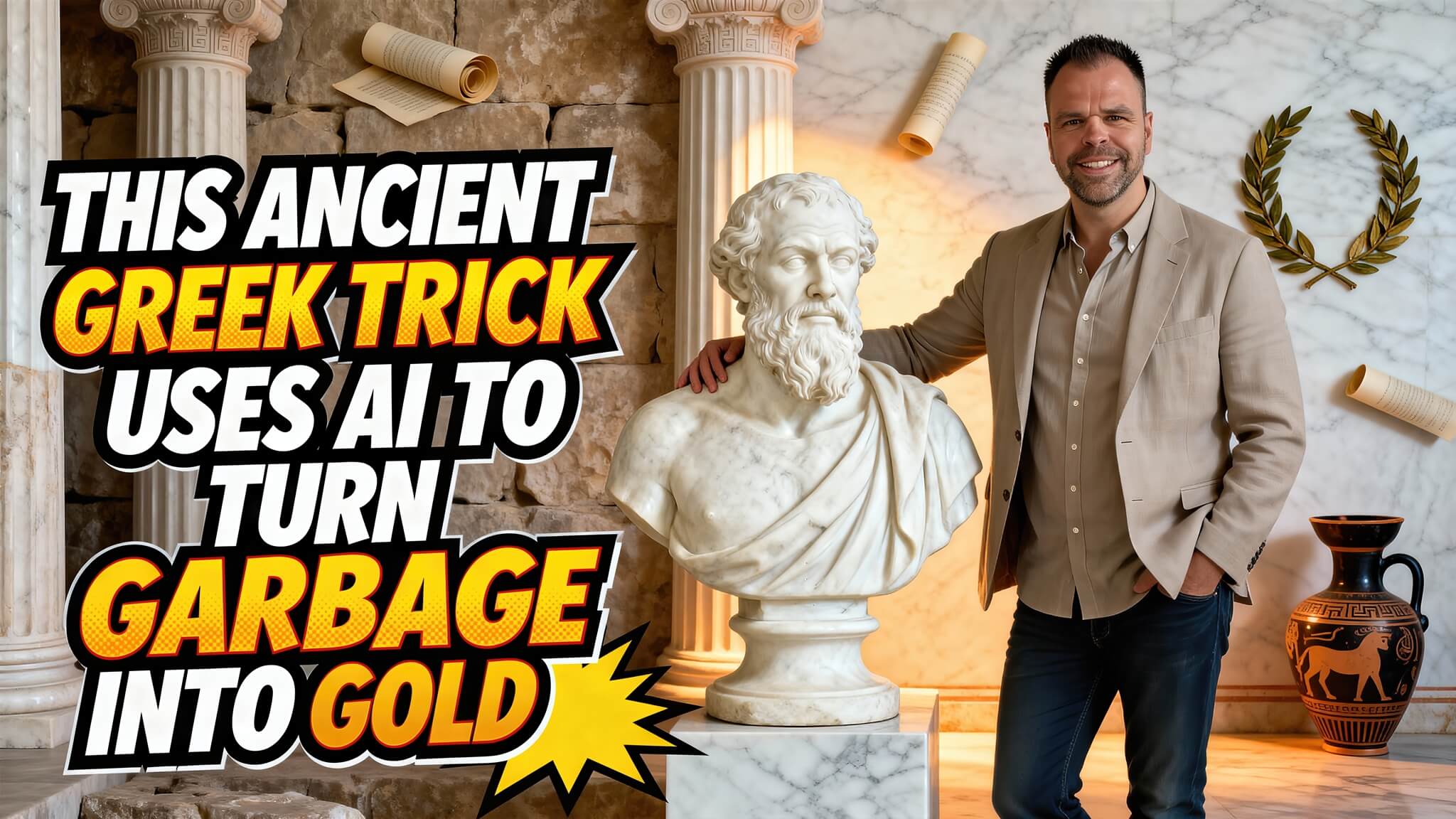I’ve been reading about Socrates recently.
You know, that guy who lived 2,400 years ago and wore a toga.
Turns out, he was the most annoying man in town (he lived in Athens, Greece).
He’d corner you in the marketplace and ask innocent questions about your “brilliant” idea.
You’d start explaining it, feeling confident. Maybe even a little cocky.
Then Socrates would tilt his head and ask “But what do you mean by that, exactly?”
You’d answer. Socrates would nod his head thoughtfully.
Then he’d ask another question. And another.
Within minutes, you’d realize something terrifying.
Your genius idea was full of holes. Assumptions you’d never examined. Contradictions you’d never noticed. It had more holes than Swiss cheese!
The powerful men in Athens hated him for this.
Politicians. Generals. Wealthy merchants.
He made them look like idiots in public.
But here’s why I’ve been so interested in him recently:
The people who survived Socrates’ interrogations? They walked away with something priceless.
Their ideas weren’t just better. They were bulletproof.
Battle tested. Every weak point identified and reinforced. Every assumption examined and either proven or replaced.
Socrates never told anyone what to think. He just asked questions that forced them to think harder.
They executed him for it in 399 BC. “Corrupting the youth,” they said. Asking too many uncomfortable questions.
But 2,400 years later? We still call his method “Socratic questioning.”
It remains the single most effective way to transform garbage into gold.
When I discovered this, something clicked:
You can have your own personal Socrates. Available 24/7. Programmed to interrogate your marketing strategies before your boss does.
That’s what you’re about to learn how to do with AI.
Let me show you how it works.
How It Works: A Socratic Dialogue with Your AI
The Socratic Method is very simple to implement.
Step 1: Present Your Idea as Truth
Start by stating your plan, strategy, or proposal.
Do it with confidence, as if you’ve already decided that’s how you’ll proceed.
Now, don’t press ENTER yet. We’ve got to add the Socrates bit.
Step 2: Command the AI to be Socrates
This is where the magic happens. Tell the AI to be Socrates and challenge what you’ve asked. Here’s an example prompt:
Act as Socrates and use the Socratic Method with me on this [plan/strategy/idea/etc]. Have a collaborative back-and-forth discussion with me to stimulate my critical thinking, helping me arrive at a logical conclusion. Only ask me one question at a time.
Note: The last sentence in the prompt is REALLY important. If you don’t tell it to limit the number of questions, you might get 100 all at once!
Step 3: Command the AI to be Socrates
At this point, the AI should respond with specific questions which will hopefully expose:
- Unsupported assumptions
- Logical inconsistencies
- Potential unintended consequences
- Missing evidence or data
- Overlooked stakeholder concerns
- Implementation challenges
What to expect:
- Questions that make you uncomfortable (that’s the point!)
- Challenges you hadn’t considered
- Devil’s advocate perspectives
- “What if?” scenarios that could derail your plan
Don’t get defensive. Take notes. These questions are your preparation roadmap.
Step 4: Refine Your Idea into “Gold”
Use the AI’s questions as your improvement checklist. For each question:
- Develop a thoughtful answer (if you can’t answer it, the AI just found a fatal flaw)
- Gather supporting evidence (data, case studies, examples)
- Anticipate the counter-argument (and prepare your response)
- Adjust your original plan (if the question revealed a legitimate weakness)
Now realize, the AI might never stop asking you questions.
And that’s perfectly okay.
The AI’s goal with this technique isn’t to “solve” the problem for you or find the right answer. It’s to guide you. Kind of like Morpheus in The Matrix. He couldn’t give Neo the answer; Neo had to find it himself.
Optional: Iterate for Deeper Refinement
For high-stakes decisions, run multiple rounds:
Round 1: General skeptic
Round 2: Specific stakeholder (your boss, client, board member)
Round 3: “Friendly critic” who wants you to succeed but sees risks
Each round sharpens your thinking and reveals new angles.
Advantages of the Socratic Method Prompt
Here’s some of the many advantages to this technique:
- Bulletproof Your Strategies Before They’re Tested
Find and fix every flaw in your plan before it faces real-world scrutiny from a boss, a client, or the market itself. Walk into meetings with confidence that comes from preparation, not hope. - Break Out of Your Own Echo Chamber
We all fall in love with our own ideas. AI acts as an impartial third party to reveal the blind spots, wishful thinking, and assumptions you can’t see yourself. - Anticipate Every Objection Before It’s Raised
Walk into high-stakes meetings, pitches, or negotiations already knowing every possible question or objection that could get thrown at you, with a well-reasoned answer ready to go. - Save Time and Avoid Expensive Mistakes
Catch fatal flaws in your strategy before you invest time, money, or political capital. A 20-minute Socratic session can save you from months of going down the wrong path. - Build Real Confidence (Not False Confidence)
There’s a difference between feeling good about your idea and knowing it can stand up to scrutiny. The Socratic Method gives you the latter. It’s confidence that’s earned, not assumed.
